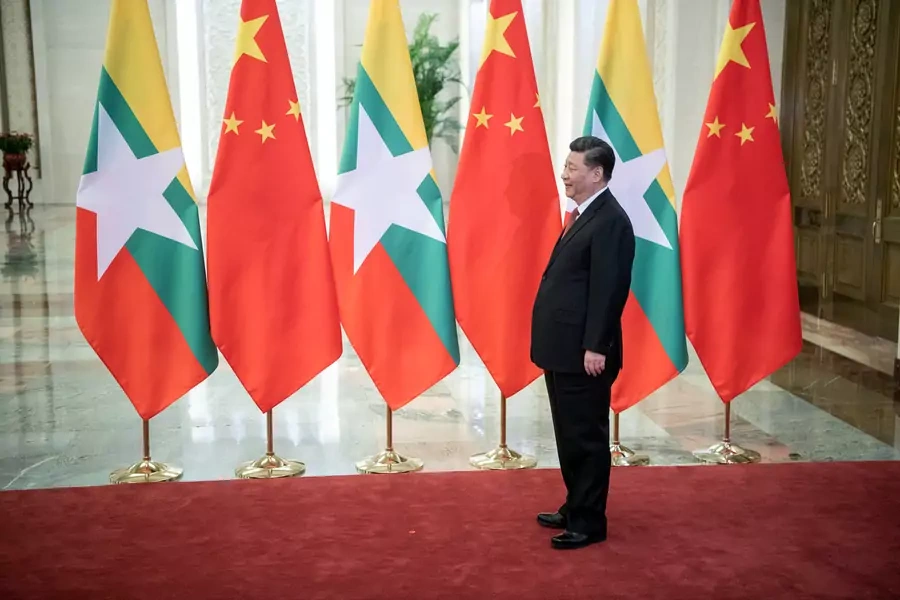China's Support for Myanmar Further Shows the World Dividing Into Autocracy versus Democracy

When the Myanmar junta first launched a coup, in February 2021, there was some discussion in the following months of the possibility that China, which had enjoyed a close relationship with the prior, National League for Democracy government, might not fully endorse the coup regime. Of course, Beijing would rhetorically back the coup leaders, but the putsch led to chaos across the country, civil war, attacks on Chinese investments, mass atrocities, refugee outflows, a spike in COVID-19, and an economic meltdown. China initially did react to the putsch with some degree of caution, as the Diplomat’s Sebastian Strangio has noted, writing: “After having invested considerably in its relationship with the ousted government led by Aung San Suu Kyi, Chinese leaders were none too happy at the seeming irrationality of the military’s action.”
Perhaps, Beijing would serve as some kind of mediating presence, simply to protect its own economic interests. And last September, Beijing sent its Myanmar special envoy, Sun Guoxiang, to Myanmar. Sun met with top junta leaders, of course, but as Strangio noted, his meeting was kept relatively low-key. Perhaps this was a sign that Beijing was not ready for a full-throated endorsement of junta rule and the idea of trying to relaunch its huge investment plans in Myanmar. Sun also reportedly asked to meet Aung San Suu Kyi during his visit, although he was not allowed to do so, and China also had invited a member of Suu Kyi’s NLD to a virtual summit for political parties from South and Southeast Asia, according to Foreign Policy.
More on:
To be fair, Strangio was not one who seemed to share the view that China would prove a mediating presence in Myanmar’s increasing bloodshed, and neither did I: He predicted that China was going to return to “business as usual” in Myanmar, and ramp up its support for the junta, return to major investments, and thus push the junta further into Beijing’s debt, which would allow China to take even greater advantage of Myanmar’s natural resources and strategic location.
And indeed, with the world distracted by the war in Ukraine, and having little bandwidth to focus on the brutality and bloodshed in Myanmar, China has done exactly that: It has dramatically ramped up support for Myanmar, further entrenching a growing split between the world’s autocracies and democracies. Just as some observers hoped Beijing would take a moderate, measured position on the Ukraine war, and have been proven wrong as Beijing has embraced Vladimir Putin and Chinese state outlets helped spread Russian disinformation, so too China has gone all in with the Myanmar regime. It is impossible to know what Xi Jinping is thinking, but it seems reasonable to believe China has stepped up open support for the Myanmar junta because it believes it can no longer even afford to appear to take a neutral stance when another authoritarian regime is involved (as indeed has been the case in the Ukraine war, where it has resolutely backed Russia), because it has decided it can most effectively protect its investments by trying to help the junta win the country’s civil war, and because, with Aung San Suu Kyi increasingly sidelined, it has no idea what would happen to China if there was a different Myanmar government, one led by forces that defeated the junta.
During a recent visit by Myanmar’s foreign minister to Anhui province of China, Chinese foreign minister Wang Yi announced, according to the Associated Press, that it would back the Myanmar regime “no matter how the situation changes,” in what the AP called “the latest show of unequivocal Chinese support for the ruling military council that seized power last year.” The AP added that Beijing desires to “deepen exchanges and cooperation” with Naypyidaw, according to Wang Yi.
Jason Tower of the United States Institute of Peace has an excellent rundown of all the ways in which Beijing is trying to help solidify the junta’s rule, even as the civil war rages and the Myanmar military faces obstacles. (Indeed, the regime continues to struggle with defections from the military, and intense fighting from both ethnic armed organizations and the newer anti-junta forces.) Tower notes that the two foreign ministers agreed to implement the China-Myanmar Economic Corridor and boost a range of cross-border cooperation including cross-border industrial zones, that China promised more support for development in Myanmar, that Beijing will allow the Myanmar regime to open a consulate in Chongqing, and that China will provide a 650 million RMB grant to Myanmar, among other measures. The junta also already has signed off on a massive new LNG plant financed by China, and is likely to approve multiple other new Chinese projects within the Economic Corridor.
The joint statement, Tower notes, also includes that China hoped the junta would help solve ASEAN’s issues with China over the South China Sea – in other words, that the junta will take China’s side and (like Cambodia has in the past) stonewall any efforts by ASEAN to push back against Beijing’s increasing domination of the contested waters.
More on:
As with Putin, Beijing no longer seems to care at all about how it is perceived regionally or internationally, and instead is fully backing autocrats.
 Online Store
Online Store